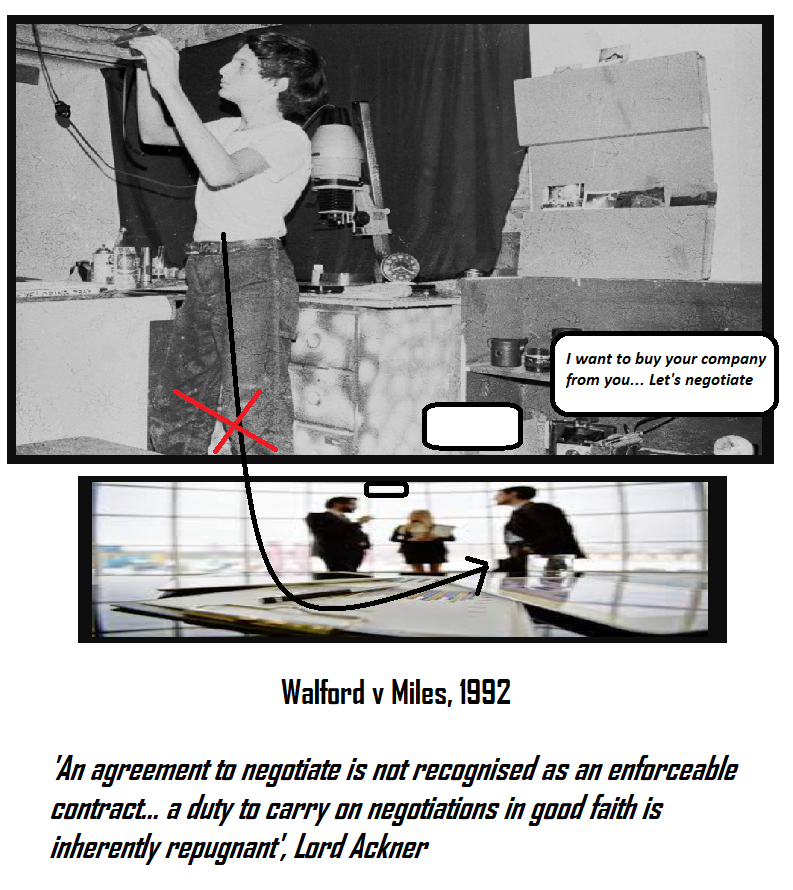Walford v Miles, 1992 2 AC 128
Citation:Walford v Miles, 1992 2 AC 128
Rule of thumb:Can a person be forced to negotiate? Are there any legal obligations on a business or property owner to have to sell it to the best bid? No, there are no legal requirements on a seller to have to sell their property to the best bidder – they can sell it to whoever they want on whatever terms they want.
Background facts:
The facts of this case were that Miles had a photography business and entered into exclusive negotiations with Walford to consider the sale of it. Walford negotiated with Miles to attempt to purchase the business. Miles did not like the tone of Walford in his attempts to purchase the business and so Miles cancelled the negotiations. Some time thereafter Miles sold the company to another buyer. Walford was annoyed because he would have purchased the business for the price Miles sold it for.
Parties argued:
Walford argued that Miles had made an offer to him to potentially purchase the business and that Miles could not then make this same offer to someone else without giving him the chance to buy the business for that price first. Miles argued that he had made no offer to Walford and that the negotiation period to try and reach a deal was an invitation to treat that held no legal obligations for him.
Judgment:
The Court upheld the arguments of Miles. It was affirmed that when 2 people are negotiating a potential transaction between them then this is an invitation that has no legal obligations, This case affirmed the principle of ‘lock-out agreements’ when a party is looking to purchase shares. At common law shareholders are free to start negotiating with a party interested in buying their shares but then walk away from negotiations for a deal and/or negotiate with other parties at any given time for absolute any reason they please, but these agreements ensure that for a certain period owners of shares are not allowed to talk to other third parties who may potentially be interested in buying their shares, and they must negotiate in good faith to ascertain what their price for selling would be – even if it is extortionate. These agreements are absolutely necessary for any party that is serious about buying the shares of someone else.

Ratio-decidendi:
'as the law now stands ... an agreement to negotiate is not recognised as an enforceable contract... The reason why an agreement to negotiate, like an agreement to agree, is unenforceable is simply because it lacks the necessary certainty. The same does not apply to an agreement to use best endeavours... However, the concept of a duty to carry on negotiations in good faith is inherently repugnant to the adversarial position of the parties when involved in negotiations. Each party to the negotiations is entitled to pursue his (or her) own interest, so long as he avoids making misrepresentations. To advance that interest he must be entitled, if he thinks it appropriate, to threaten to withdraw from further negotiations or to withdraw in fact in the hope that the opposite party may seek to reopen the negotiations by offering him improved terms... In my judgment, while negotiations are in existence either party is entitled to withdraw from these negotiations, at any time and for any reason. There can be thus no obligation to continue to negotiate until there is a 'proper reason' to withdraw. Accordingly, a bare agreement to negotiate has no legal content ... I believe it is helpful to make these observations about a so-called 'lock-out' agreement. There is clearly no reason in English contract law why A, for good consideration, should not achieve an enforceable agreement whereby B agrees for a specified period of time not to negotiate with anyone except A in relation to the sale of his property... What A has achieved is an exclusive opportunity, for a fixed period, to try and come to terms with B, an opportunity for which he has, unless he makes his agreement under seal, to give good consideration. I therefore cannot accept [counsel for the Appellant's] proposition ... that without a positive obligation on B to negotiate with A the lock-out agreement would be futile.’ Lord Ackner
Warning: This is not professional legal advice. This is not professional legal education advice. Please obtain professional guidance before embarking on any legal course of action. This is just an interpretation of a Judgment by persons of legal insight & varying levels of legal specialism, experience & expertise. Please read the Judgment yourself and form your own interpretation of it with professional assistance.

